news
Pongpat Putthinun presents at AAIC Satellite in Lima
Winston Chiong
May 15, 2025
Continuing on the theme of international scientific travel, Pongpat Putthinun was at the AAIC Satellite Meeting in Lima, Peru, to present on strategies to improve knowledge about healty behaviors to prevent dementia in Thailand, with potential implications for other low- or middle-income countries. Congrats Pongpat!
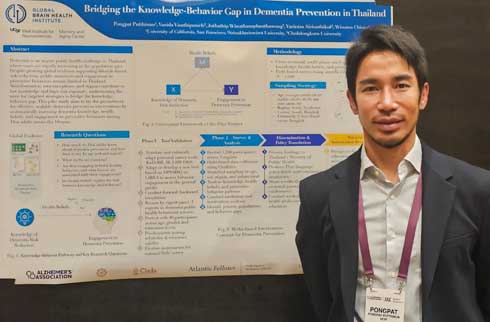
Decision Lab at Neuroethics 2025 in Munich
Winston Chiong
April 25, 2025
We recently welcomed Juliana to Decision Lab and Chanel to UCSF Bioethics, and then very soon afterwards traveled together to exchange ideas and hopefully initaite new collaborations with scholars from around the world at the International Neuroethics Society meeting in Munich. As other exciting news, we will co-host next year’s Neuroethics 2026 meeting, which will be utilizing a new multi-hub global model with hubs in Palo Alto, Tuscany, and we hope a few other places. We are very excited about this new plan and look forward to providing more updates about this model soon.
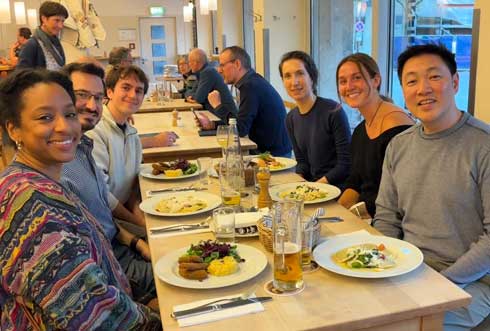
Sending off Clara (and Rea) to the airport
Winston Chiong
December 16, 2024
2024 has been a year of growth and transformation for the lab. Several long-standing members who’ve helped to define the atmosphere and approach of the lab have moved on to exciting new roles and programs, and so we’ve welcomed nearly an entire new team of enthusiastic researchers bringing fresh perspectives and new ideas. Similarly, we’re wrapping up three large research projets that have been central to our lab’s work over the last few years, while starting up three new projects that will take us in new directions.
As part of this turnover, we had to bid a bitterweet goodbye to Clara, who is returning to Europe for another postdoc that will bring her back closer to family as she grows her own family. We are all so excited for her and Aurelien and look forward to many updates and photos. By sheer luck and coincidence, Rea turned out to be returning to Europe for her Winter Break on the exact same flight! So, we got to wish them off with a very American lunch of burgers and fries before sending them off to the airport. We’ve still got some exciting scientific projects to wrap up with Clara even after her postdoc is officially over, so there will be much more work and personal catching up over the next few months, but we’ll really miss having her in person (while also acknowledging that her family is very excited to have her back)!
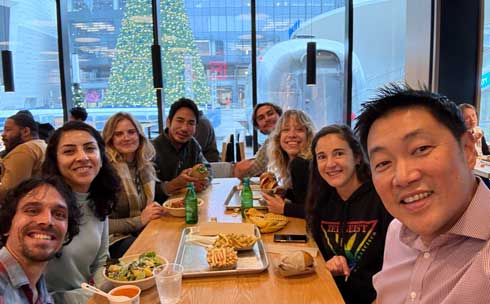
BBQ 2024 - welcome Marcus, Valerie, and Maya + welcome back Cailin, Madhu, Celeste & Clayton
Winston Chiong
October 12, 2024
For this year’s Decision Lab fall BBQ, we welcomed Marcus, Valerie, and Maya to the lab. Marcus is a new research coordinator with a background in neuroscience and bioethics. Valerie is a postdoc supporting our empirical ethics projects; she trained in cultural and medical anthropology at UC Berkeley. Meanwhile, Maya is currently the course assistant for UCSF’s human subjects Responsible Conduct of Research course, but will be joining the lab soon to think about neuroethics.
In addition, we were really happy to be joined by some Decision Lab alums, Cailin (now an attorney working on disability and health care advocacy), Madhu (now a pediatrics intern at Benioff Children’s Oakland), Celeste (now a clinical ethics fellow at Sutter), and Clayton, a data engineer for a neuroscience startup. So glad they could share ther experiences in lab with our new arrivals, and it was great to hear more about how their lives and careers have developed!
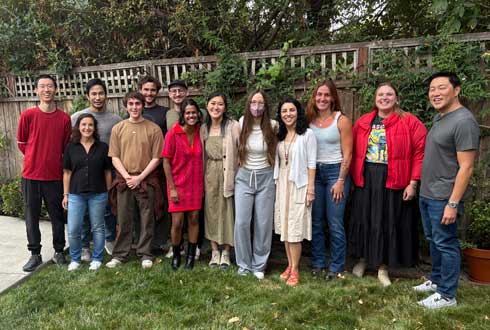
Two neuroethics podcasts
Winston Chiong
August 23, 2024
Members of the lab have been interviewed for two podcast episodes about challenging topics in clinical neuroethics. First, Colin Hoy was interviewed for the Neurology podcast to discuss ethical considerations around the diagnosis of prodromal Parkinson’s disease, a companion to an editorial that Colin and I wrote:
Second, I got to have a fun conversation for the GeriPal (Geriatrics and Palliative Care) podcast with Sean Aas, prompted by Sean’s thought-provoking recent article on philosophical and conceptual problems with brain death. (A topic I haven’t written about in a long time, but which I may need to return to…)
Farewell to Rea and Brandon!
Winston Chiong
June 27, 2024
After all this time, I didn’t realize that there even was a Decision Lab pizza place! This evening the lab piled into my minivan for a trip out to North Beach for pizza and pasta at Il Casaro – and later, yummy cannolis and cookies. We’re wishing a fond farewell to two longtime lab members. Rea has been with the Decision Lab and the Rankin Lab since before the pandemic, and in addition to amazing science has done so much to help support everyone in our lab and Kate’s lab during some very challenging years. Meanwhile, Brandon first joined the lab in 2021 (he had to start remotely); it’s been awesome to see him develop and refine his interests while in lab, and lab meetings just won’t be the same without the Kobe memes.
Best of luck to both of you – so proud!
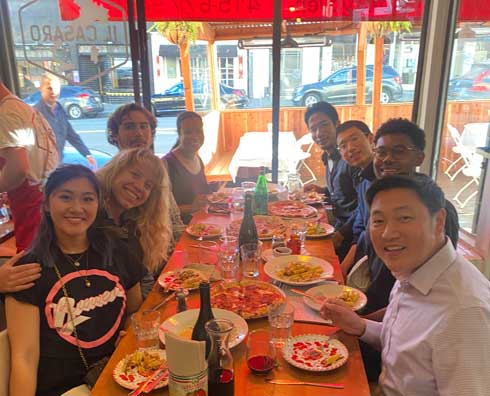
 Decision Lab
Decision Lab